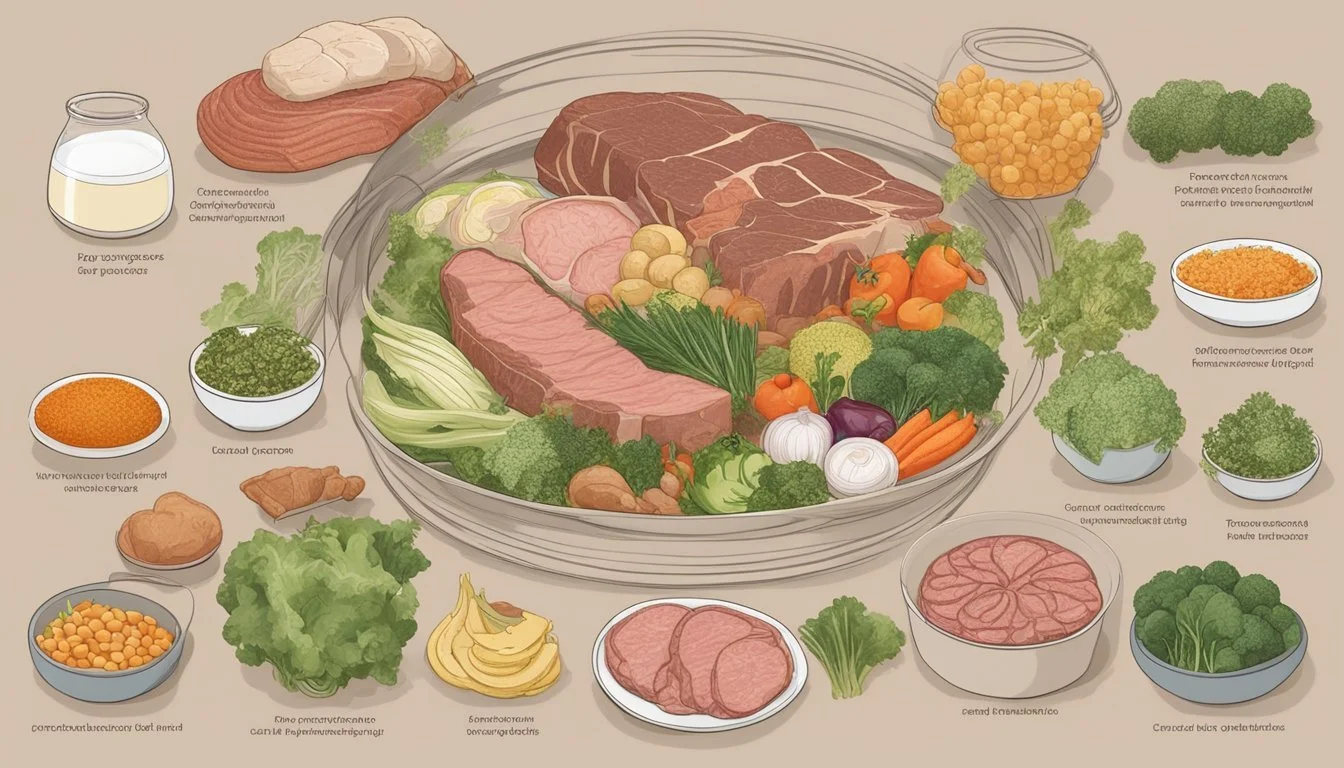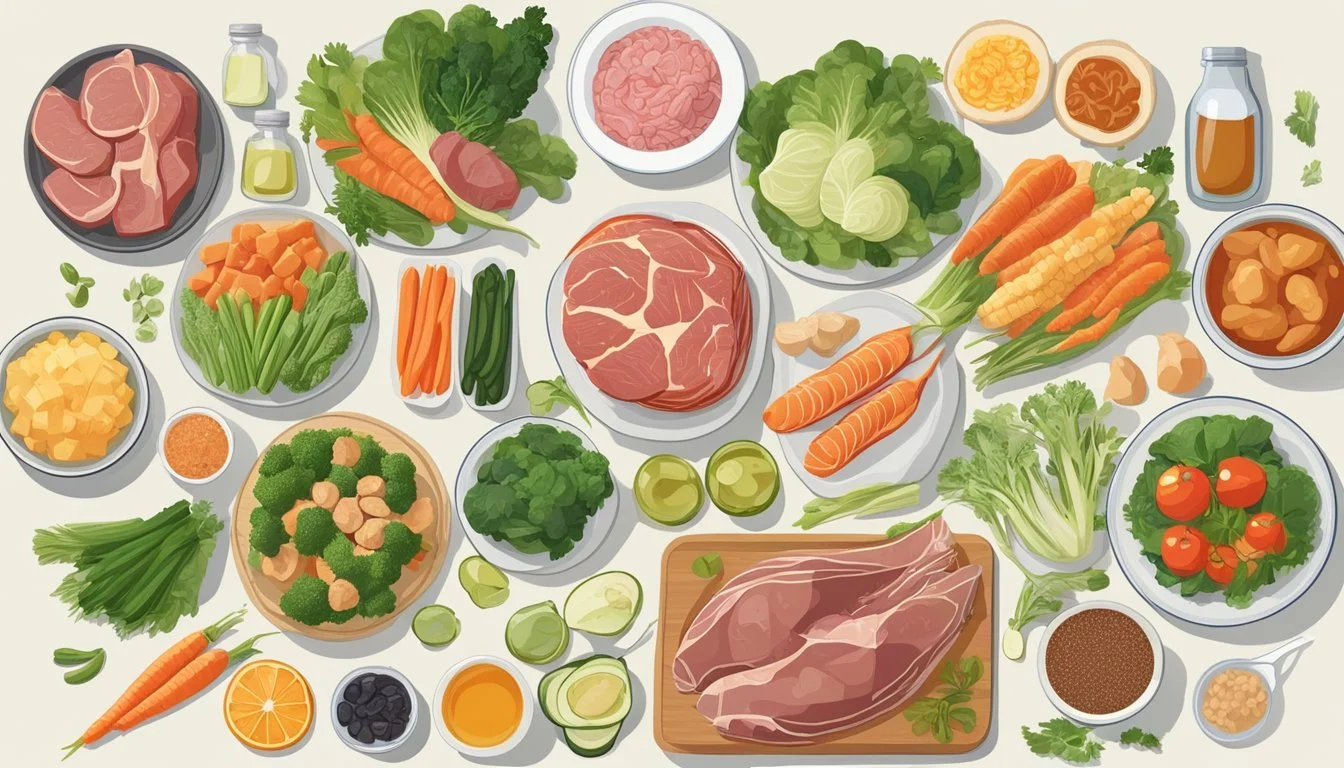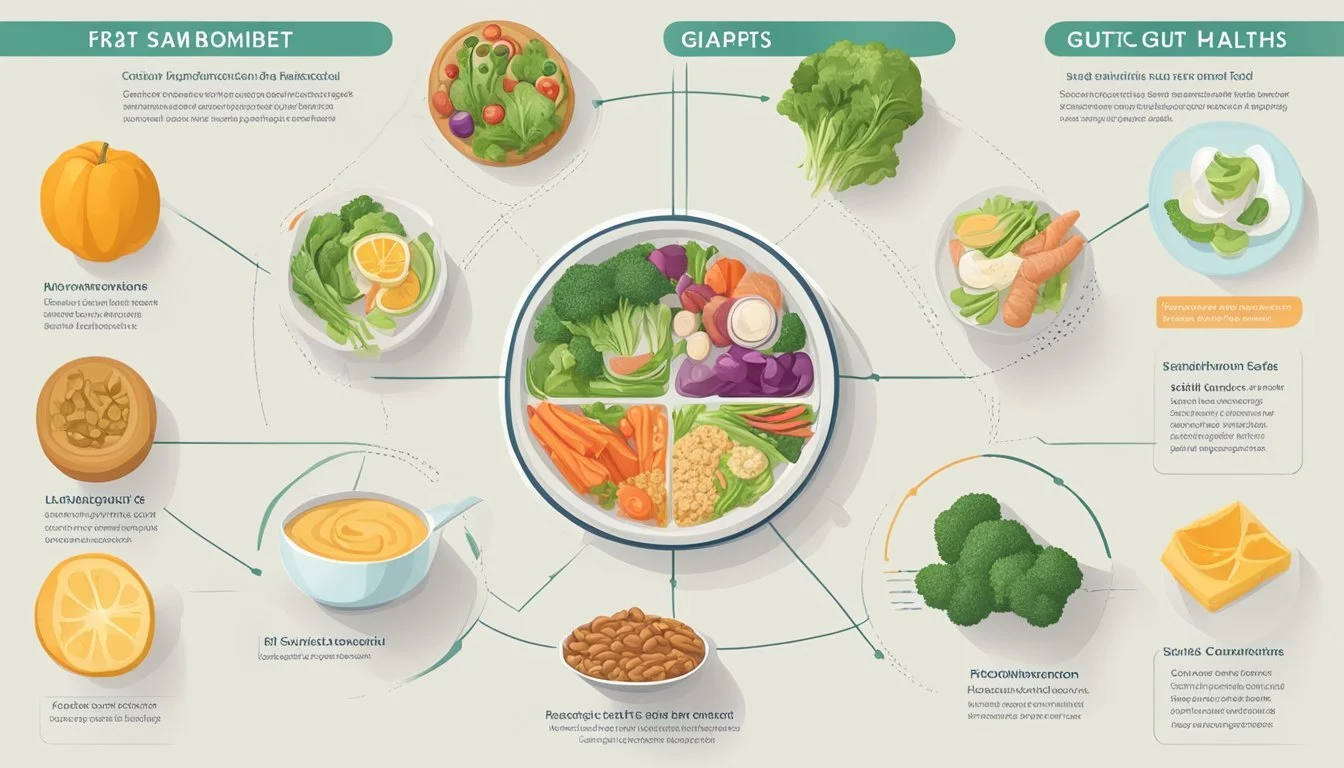Carnivore Diet vs. GAPS Diet
Comparing Gut Health Benefits and Approaches
Comparing the Carnivore and GAPS diets reveals two distinct approaches to improving gut health and overall wellbeing. The Carnivore Diet is an exclusionary diet that consists exclusively of animal products. Proponents claim it can reduce inflammation, aid in weight loss, and simplify the complexities of nutritional planning by focusing on a meat-based food consumption. This strict regimen eliminates plant-based foods with the view that it may alleviate autoimmune disorders and other health issues.
On the other hand, the GAPS Diet, short for Gut and Psychology Syndrome Diet, was developed with a different philosophy on gut health. It operates on the premise that many physical and neurological ailments stem from an imbalance in intestinal flora and a compromised gut lining. Therefore, it emphasizes the removal of foods believed to contribute to gut permeability and encourages the intake of nutrient-dense options to restore the gut microbiome balance.
Both diets share a common goal of enhancing gut health but take divergent paths, with the Carnivore Diet focusing on the elimination of all but animal products and the GAPS Diet advocating for a more gradual reconstitution of the gut flora through strategic dietary changes. Each diet's efficacy for improving gut health hinges on individual responses and specific health conditions, demonstrating that dietary interventions should be personalized.
Diet Overviews
This section provides a comparative look at the Carnivore and GAPS diets, which are both considered restrictive yet serve different purposes and principles centered around gut health improvement.
Carnivore Diet Basics
The Carnivore Diet is characterized by its exclusive consumption of animal products such as fresh meat, fish, eggs, and animal fats. It is a highly restrictive diet that eliminates all plant-based foods. Proponents believe that focussing entirely on healthy fats and proteins can lead to various health benefits, especially for those struggling with autoimmune diseases and digestive problems.
GAPS Diet Principles
Formulated by Dr. Natasha Campbell-McBride, the GAPS Diet targets gut health by introducing an elimination diet protocol that heavily features fermented foods, (What wine goes well with fermented foods?) bone broth, and a specific selection of animal products. The diet connects the state of gut health to psychological and physiological conditions, advocating for the intake of nutrient-rich, unprocessed foods.
GAPS Diet Stages
The GAPS Diet unfolds in several stages:
Introduction Phase: A gradual incorporation of foods, starting with easily digestible ones like homemade bone broth and fermented vegetables.
Full GAPS Diet: After the introduction phase, it includes a broader range of allowed foods but maintains a strong emphasis on animal fats, fermented foods, and exclusion of starchy vegetables and refined carbohydrates.
Reintroduction Phase: A stage where previously excluded foods are carefully reintroduced to the diet, allowing individuals to monitor for adverse reactions and gauge which foods they may be sensitive to.
Through a tailored approach to nutrition, both diets address gut health, albeit via distinctly different methodologies and rationales.
Gut Health and Diet
In exploring the impact of diet on gut health, it's crucial to understand how specific dietary choices can affect the gut lining, bacterial balance, and overall digestive health. The Carnivore Diet and the GAPS Diet approach gut health from different angles, each with a focus on particular dietary restrictions or inclusions that are believed to influence gut integrity and function.
Impact of Carnivore Diet on Gut Health
The Carnivore Diet, consisting solely of animal products, posits that an all-meat regimen can reduce inflammation and heal issues like leaky gut. Proponents argue that removing plant fibers may lessen irritation of the gut lining. However, concerns arise over long-term gut microbiome diversity, as this diet severely limits probiotic foods that contribute to a healthy gut flora.
GAPS Approach to Improving Gut Health
In contrast, the GAPS Diet emphasizes a diverse intake to nurture gut health, including probiotic-rich foods such as fermented vegetables and bone broth that aim to repair the intestinal lining. The dietary protocol, designed to reintroduce beneficial bacteria and reduce intestinal permeability, recommends a structured progression through various stages for repairing the digestive system.
Comparison of Digestive Benefits
Comparing Carnivore and GAPS Diets
Focus
Carnivore Diet: High animal protein; no plant-based fibers.
GAPS Diet: Balanced protein; fermented foods; digestive healing.
Intestinal Permeability
Carnivore Diet: Seeks to address leaky gut by excluding potential irritants.
GAPS Diet: Aims to gradually restore gut lining and reduce leaky gut.
Probiotics
Carnivore Diet: Largely absent due to the exclusion of plant-based and fermented foods.
GAPS Diet: Probiotic foods are integral to the diet for supporting beneficial bacteria.
Supplementary Foods
Carnivore Diet: None, as the diet only includes animal products.
GAPS Diet: Supplements and foods like bone broth for gut health support.
While the Carnivore Diet simplifies the approach to food intake, potentially easing digestive issues for some, the GAPS Diet provides a more comprehensive strategy centered around improving the gut microbiome and addressing various digestive health concerns.
Nutritional Perspectives
This section highlights how the Carnivore and GAPS diets approach nutrition, focusing on the content and balance of nutrients in each.
Nutrient Content in Carnivore Diet
The Carnivore Diet is characterized by its exclusive consumption of animal products, emphasizing high protein intake—typically from meat, fish, and eggs. Sources of protein in the Carnivore Diet are rich in iron and vitamins such as B12. However, the exclusivity of animal products means it lacks fiber, typically found in plant-based foods such as vegetables, fruits, and grains. Additionally, other nutrients prevalent in plants, including certain vitamins, and phytonutrients, are absent.
Nutritional Considerations for GAPS Diet
The GAPS Diet incorporates a wider range of food groups, allowing for organic food from both animal and plant sources. It includes a variety of vegetables and fruits, thereby providing fiber along with essential vitamins. Fermented foods like kefir and yogurt play a vital role, contributing beneficial bacteria that support gut health. Nuts are also included, offering additional protein, fiber, and healthy fats. However, the GAPS Diet restricts grains and refined sugar, focusing on natural food sources for nutrients.
Health Outcomes and Risks
In comparing the Carnivore and GAPS diets, it's critical to assess both the potential health outcomes and associated risks, particularly as they pertain to mental and physical health. These dietary approaches claim various benefits but also carry risks that must be carefully considered.
Mental Health Implications
The GAPS Diet, which stands for Gut and Psychology Syndrome, aims to improve mental health by addressing gut health. Dr. Natasha Campbell-McBride, the creator of the GAPS diet, posits that a leaky gut can lead to a range of psychological conditions including autism spectrum disorder, ADHD, depression, and other mental health issues. Proponents suggest that by healing the gut with a specific nutritional protocol, brain function may improve, although comprehensive scientific studies are needed to substantiate these claims.
The Carnivore Diet, by contrast, emphasizes eating only animal products—primarily ruminant meat—to achieve health benefits. Anecdotal evidence from some individuals who follow a carnivore lifestyle includes reports of increased focus and alleviation of symptoms associated with mental health conditions like depression and anxiety. However, robust scientific evidence is limited, and the diet's long-term impact on mental health remains under-researched.
Physical Health Effects
On physical health, the Carnivore Diet purports to reduce inflammation, which can be a factor in autoimmune conditions, and aid in weight loss. It's reported by some adherents to have positive effects on stabilizing blood sugar levels, potentially making it of interest to individuals with diabetes. However, it's high in saturated fat, which may increase LDL cholesterol and the risk of heart disease. The diet excludes sources of nutrients not found in meat, which may increase the risk of nutrient deficiencies over time.
The GAPS Diet is also believed by its proponents to have physical health benefits, especially for those with autoimmune conditions and allergies, due to its elimination of potential gut irritants. However, the diet can be restrictive and may not provide all necessary nutrients, emphasizing the need for careful planning and possibly supplementation. The GAPS Diet has been claimed to improve hormone balance and physical symptoms linked to autism and ADD, although these outcomes are not universally observed and more evidence is needed.
Both diets could have profound effects on overall health and wellbeing. Individuals with specific health conditions or concerns should consult healthcare professionals before adopting either diet, and they should consider that while anecdotal evidence may be compelling, robust clinical research is still lacking.
Diet Implementation and Challenges
Transitioning to a new dietary regiment such as the Carnivore or GAPS Diet often involves significant lifestyle changes and can benefit from guidance by nutrition experts like registered dietitians or doctors.
Easing into the Carnivore Diet
Individuals adopting the Carnivore Diet typically begin by focusing on a menu primarily composed of fresh meat and animal fats. One might start with frequent meals, gradually reducing the quantity as their appetite adjusts to this high-fat, high-protein diet. It is crucial to select quality meats from sources like grass-fed cattle or pastured pork to maximize health benefits. Incorporating this diet is more than a mere change in food choices—it's a shift towards natural treatment perspectives for various health conditions.
GAPS Diet Implementation Phases
The GAPS Diet unfolds in distinct stages, starting with the Introduction Diet, which is about consuming easily digestible foods like bone broth and fermented vegetables. As one progresses, they can include more complex foods such as raw vegetables and pastured dairy. This diet aims to gradually repair the gut lining and restore balance to the gut’s microbiome, thus it is implemented methodically to observe the body's responses to new foods and avoid abrupt digestive disruptions.
Challenges and Considerations for Both Diets
Both diets can be quite restrictive, excluding staples like refined sugars, baked goods, processed foods, and additives, posing a challenge for individuals accustomed to typical Western diets. The restricted food variety necessitates community support and possibly coaching for successful adherence and to prevent nutritional deficiencies. For both, ongoing research by scientists helps to inform potential adopters of the benefits and drawbacks, but testimonies of improved gut health and reduced inflammation are common among committed followers.
Conclusion
The Carnivore Diet and the GAPS Diet represent two distinct approaches to eating with a shared emphasis on improving gut health.
Carnivore Diet:
Emphasizes consumption of animal proteins exclusively
Eliminates plant-based foods altogether
GAPS Diet:
Encourages a balance of animal and plant proteins
Focuses on including gut-healing foods like bone broth and fermented foods
When assessing these diets for their role in healthy eating and long-term health, individuals should consider their unique dietary needs and lifestyle choices. The Carnivore Diet's restrictive nature eliminates sources of fiber and certain vitamins found in plants, which could have implications for gut microbiota diversity. In contrast, the GAPS Diet's inclusion of a variety of foods might offer more balance, potentially fostering a healthier gut environment.
Regardless of the chosen diet, maintaining a focus on gut health is critical. Both diets aim to reduce inflammation and support the gut lining, but the methods of achieving these goals differ. As with any dietary regimen, the impact on an individual's health should be monitored by health professionals.
Making informed choices about one's diet is essential. People considering either the Carnivore or GAPS Diet should weigh the evidence and rationale behind each and reflect on how well these diets align with their personal health objectives and lifestyle.
FAQs
In this section, readers will find answers to some of the most frequently asked questions revolving around the Carnivore and GAPS diets, each aimed at improving gut health through specific dietary strategies.
Common Questions on Carnivore Diet
The Carnivore Diet centers on consuming exclusively animal products. Questions often arise regarding its health implications and its strict zero-carb approach.
Is the Carnivore Diet high in cholesterol and saturated fat? Yes, it typically includes a higher intake of both cholesterol and saturated fat since it relies on meat, including organ meats and other animal products.
Will a zero-carb diet lead to deficiencies? It might lead to nutrient deficiencies since it excludes plant-based foods, which are important sources of vitamins, minerals, and fiber. Regular monitoring and possible supplementation are recommended.
General Inquiries About GAPS Diet
The GAPS Diet is designed to heal the gut by eliminating foods that damage the gut lining and offering nutrient-dense alternatives, aiming to improve the gut-brain connection and address mental disorders.
What is the idea behind natural healing in the GAPS Diet? The diet operates on the principle that a healthy gut contributes to a healthy brain, suggesting that dietary changes can improve symptoms related to various mental disorders.
Does the GAPS Diet restrict any specific nutrients like the Carnivore Diet? While not zero-carb, the GAPS Diet excludes processed foods, grains, and refined sugars but emphasizes fermented foods, bone broth, and grass-fed butter, which can provide a range of nutrients.






